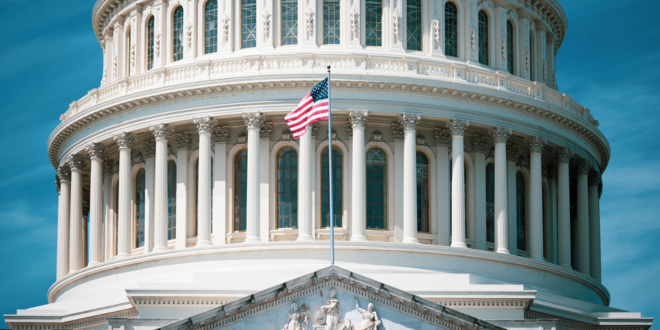The One Big Beautiful Bill Act’s Impact on Health Care

The One Big Beautiful Bill Act (P.L.119-21) was signed into law by President Trump on July 4 after the House passed the legislation on July 3 by a vote of 217-215 and the Senate passed the legislation July 1 with a vote of 51-50 with Vice President JD Vance breaking a tie due to opposition by three Republicans.
Congress used the budget reconciliation process to extend expiring 2017 tax cuts and other Administration priorities, while using health care, especially Medicaid, to partially pay for the new law. The Congressional Budget Office (CBO) estimates that Medicaid would be cut by over $1 trillion through work requirements, changes to provider taxes and other provisions leaving an estimated 10 million people uninsured by 2034. The negative effects to health care from this bill will be wide-reaching.
Unlike past large, spending bills, many popular health care extender provisions were not addressed in this bill. However, Congress did include a 2.5 percent update to the Medicare Physician Fee Schedule for one year starting in 2026.
The following identifies just some of the health care highlights of the new law but is not all-encompassing.
Medicaid
- Applies new limits on provider taxes. Currently, state provider taxes must be no higher than 6% of net patient revenue to comply with a safe harbor that avoids a loss of federal financial participation. For a state that has expanded Medicaid, this percentage will be reduced to lower of the net patient revenue percentage for a federally approved provider tax in effect on July 4, 2025 or a percentage of net patient revenue starting at 5.5% for fiscal year 2028 and declining by 0.5% annually to 3.5% for federal fiscal year 2032. For a state that has not expanded Medicaid, the safe harbor percentage will be limited to the percentage for a federally approved tax on the applicable class of items or services in effect on July 4, 2025. The percentage will be zero for a provider tax on a class of items or services for which there was not a provider tax enacted as of July 4, 2025 that is eventually federally approved. The practical impact is that states will not be able to adopt provider taxes on a class of items or services for which a provider tax was not federally approved as of July 4, 2025, and will be limited in modifying existing provider taxes to the current percentage of net patient revenue for expansion states, and beginning fiscal year 2028 the lower of such percentage or the reduced percentages noted above. (Effective upon enactment, but states may have up to 3 fiscal years to transition existing arrangements that do not comply.)
- Directs the Secretary of Health and Human Services (HHS) to revise state directed payment regulations to cap the total payment rate for inpatient hospital and nursing facility services at 100 percent of the total Medicare rate for expansion states and 110 percent of the Medicare rate for non-expansion states. If no Medicare rate exists, the cap defaults to the Medicaid fee-for-service payment rate. Incudes a grandfathering provision that applies to directed payment programs approved by the federal government or for which approval was sought prior to May 1, 2025, or for which approval was sought on or before July 3, 2025. Grandfathered payments will be reduced effective with rating periods beginning on or after January 1, 2028, by 10 percent annually until the applicable Medicare limit is reached. (Effective upon enactment.)
- Establishes a $50 billion rural health grant program for states between fiscal years 2026 and 2030 to be used for payments to rural health facilities. (Effective upon enactment but funding is first available January 1, 2026)
- Prohibits federal Medicaid funds for one year from enactment from being paid to providers that are, as of the first day of the first quarter beginning after enactment, nonprofit organizations engaged primarily in family planning services, reproductive health and related medical care and provide for abortions outside of the Hyde Rule and received $800,000 or more in payments from Medicaid in 2023. (Effective upon enactment.)
- Requires states to implement 80-hour a month work requirements for all Medicaid individuals ages 19-64, with some exceptions. (Effective no later than December 31, 2026.)
- Requires states to conduct eligibility redeterminations at least every 6 months for Medicaid expansion adults. (Effective for renewals scheduled on or after December 31, 2026.)
- Requires states to obtain contact information on all Medicaid enrollees. (Effective January 1, 2027.)
- Requires HHS to establish a system to prevent Medicaid enrollment in two states simultaneously. (Effective October 1, 2029.)
- Requires states to review the Master Death File at least quarterly to determine if any enrolled individuals are deceased. (Effective January 1, 2027.)
- Eliminates the temporary incentive for states that newly adopt expansion under the American Rescue Plan Act of 2021. (Effective January 1, 2026.)
- Eliminates enrollment fees for expansion adults and requires states to impose cost sharing of up to $35 per service on expansion adults with incomes 100-138 percent of the federal poverty level (FPL). It exempts primary care, mental health, and substance use disorder services, as well as services provided by federally qualified health centers, behavioral health clinics, and rural health clinics. (Effective October 1, 2028.)
- Limits federal matching payments for Emergency Medicaid for individuals who would otherwise be eligible for expansion coverage except for their immigration status. (Effective October 1, 2026.)
- Prohibits the Secretary of HHS from implementing, administering, or enforcing certain provisions from the Centers for Medicare & Medicaid Services (CMS) Eligibility and Enrollment final rule until October 1, 2034. (Effective upon enactment.)
- Restricts Medicaid or Children’s Health Insurance Plan (CHIP) eligibility to U.S. citizens and nationals, lawful permanent residents (LPRs), certain Cuban and Haitian immigrants, citizens of the Freely Associated States lawfully residing in the U.S., except that CHIP funding may still be used for expenditures for health services initiatives under the plan for improving the health of children. (Effective October 1, 2026.)
- Limits retroactive coverage to one month prior to application for coverage for expansion enrollees and two months for traditional coverage. (Effective January 1, 2027.)
- Requires states to conduct monthly checks on enrollment and reenrollment for whether HHS has terminated a provider or supplier from Medicare or if another state has terminated a provider or supplier from participating in Medicaid or CHIP. Requires states to conduct quarterly checks of the Death Master File to determine Medicaid providers are deceased. (Effective January 1, 2028.)
- Requires the Chief Actuary for CMS to certify that 1115 waivers do not increase federal expenditures compared to what would have occurred without the waiver formalizing and potentially tightening existing budget neutrality requirements. (Effective January 1, 2027.)
- Requires HHS to reduce federal financial participation to states for identified improper payment errors related to payments made for ineligible individuals and overpayments made for eligible individuals, and where insufficient information is available to confirm eligibility. (Effective Fiscal Year 2030.)
- Allows states to establish 1915(c) Home and Community Based Services (HCBS) waivers for people who do not need an institutional level of care. (Effective July 1, 2028.)
Affordable Care Act
- Bars any consumer who enrolls in a plan via a non-qualifying life event (QLE) special enrollment period (SEP) from receiving subsidized coverage in the form of premium tax credits or cost-sharing reduction (CSR) payments. For example, if an Exchange provides an SEP due to changes in household income, an individual enrolling under that SEP is ineligible for subsidized coverage. (Effective plan years beginning after December 31, 2025.)
- Ends auto-renewals and requires information verification by the Exchange before coverage to receive premium tax credits or CSR payments. If an Exchange does not have a process for pre-enrollment verification, enrollees will be ineligible for premium tax credits or CSR payments. (Effective for taxable years after December 31, 2027.)
- Requires that all premium tax credit recipients repay the full amount of any excess, eliminating repayment limits for low-income individuals (household income less than 400 percent of the FPL). (Effective for taxable years after December 31, 2025.)
- Limits eligibility for subsidized ACA Marketplace coverage to U.S. citizens and nationals, lawful permanent residents, Compact of Free Association migrants, and certain immigrants from Cuba and Haiti. (Effective January 1, 2027.)
- Eliminates the rule permitting individuals earning less than 100 percent of the FPL to receive ACA Marketplace subsidies if they are ineligible for Medicaid due to immigration status. (Effective for taxable years after December 31, 2025.)
Medicare
- Provides a 2.5 percent payment increase under the Medicare Physician Fee Schedule for one year. (Effective January 1, 2026.)
- Imposes a 10-year moratorium (through FY 2034) on implementation, administration, or enforcement of the minimum staffing levels required by the May 10, 2024, CMS final rule requiring long-term care facilities to meet such requirements. (Effective upon enactment.)
- Modifies the orphan drugs exclusion in Medicare drug price negotiation to include drugs designated for one or more rare diseases or conditions and where the only approved indications are for one or more rare diseases or conditions. (Effective for drug price selection beginning in 2026 for negotiate prices available after January 1, 2028.)
- Restricts Medicare eligibility to only U.S. citizens and nationals, lawful permanent residents, Compact of Free Association migrants, and certain immigrants from Cuba and Haiti. Termination of coverage for those not in the above categories but currently receiving coverage will occur 18 months after enactment. (Effective upon enactment.)
Health Savings Accounts
- Allows health savings accounts (HSA) to treat ACA individual market bronze level and catastrophic health plans as high-deductible health plans (HDHPs). HDHP participants currently qualify for HSA plans. (Effective January 1, 2026.)
- Allows HDHPs to permanently cover telehealth and other remote services before the deductible and still qualify as an HSA eligible HDHP. (Effective January 1, 2025.)
- Updates certain Direct Primary Care (DPC) arrangements to no longer be considered health plans, allowing individuals covered by these arrangements to be eligible for HSAs. This applies if the fixed periodic fees for the DPC do not exceed $150 monthly, or $300 monthly where more than one individual is covered. (Effective January 1, 2026.)
Professional
As our firm continues to assess the overall impact of this new law, our legal and policy experts will send additional analyses highlighting specific areas of this bill. If you have questions, please contact Kelly Delmore, Monica Massaro, Paul Garcia, Lloyd Bookman, Katrina Pagonis, Kelly Carroll, Alicia Macklin, or your regular HLB contact.

